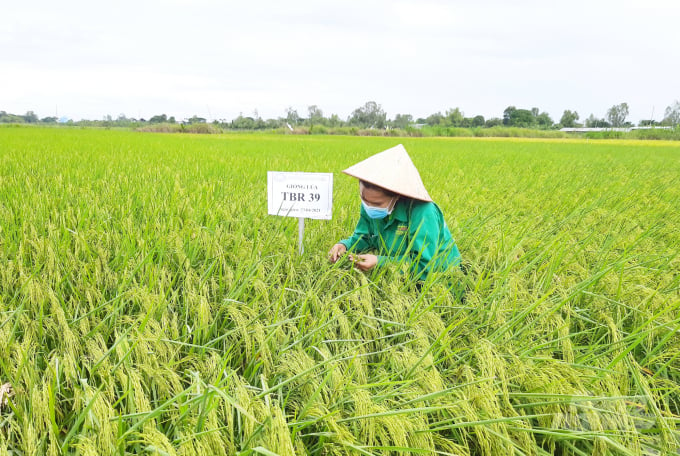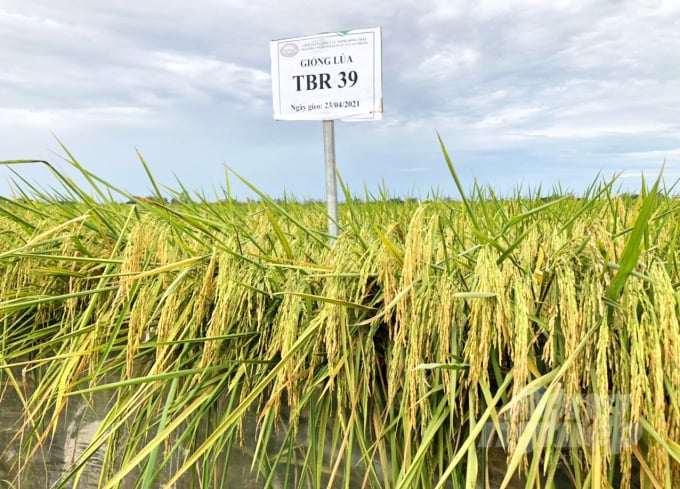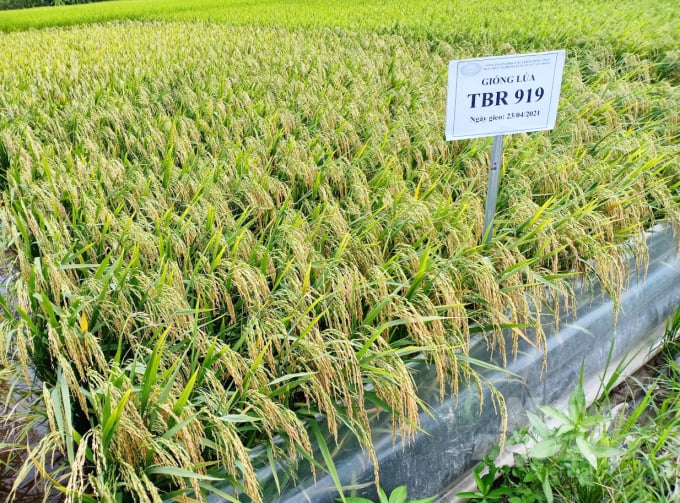December 7, 2025 | 00:27 GMT +7
December 7, 2025 | 00:27 GMT +7
Hotline: 0913.378.918
December 7, 2025 | 00:27 GMT +7
Hotline: 0913.378.918

Doseco is one of Mekong Delta’s pioneers in the seed industry that focuses on developing a selection strategy for new high-adaptability rice varieties, ensuring the quality meets export standards. Photo: Ngoc Trinh.
According to the Department of Crop Production (MARD), immediately after the Government issued Resolution 120 on sustainable development of the Mekong Delta to adapt to climate change, the MARD actively implemented many important works related to climate change adaptation in this area. The seed phase in particular is considered an important factor contributing to the success of a crop.
Since 2017 the Mekong Delta has reduced hundreds of thousands ha of inefficient rice cultivation, and rice production in the Mekong Delta has remained stable at approximately 24 million tons per year.
This stability in output is thanks to the MARD having prepared sets of rice varieties that can adapt to climate change in the Mekong Delta while still ensuring high yield and quality. As a result, if the average yield in the whole region was 5.7 tons/ha/crop in 2017, by 2021 the number has risen to 6 tons/ha/crop.

The variety TBR39 test-planted in the Mekong Delta and the Southeast region will soon complete additional documents to receive official recognition from the Ministry of Agriculture and Rural Development. Photo: Ngoc Trinh.
Playing a part in the selection of new varieties adaptive to climate change, Dong Thap Seeds Joint Stock Company (Doseco) is one of Mekong Delta’s pioneers in the seed industry that focuses on developing a selection strategy for new high-adaptability rice varieties, ensuring the quality meets export standards. Especially after cooperating with ThaiBinh Seed Corporation (ThaiBinh Seed) in 2019, the issue of rice variety hybridization and selection is further invested and promoted.
Doseco's tireless efforts have been paid off with positive signals. Several promising new varieties have been selected such as TBR919 with a growth period of 85 - 90 days, capable of replacing the low-grade rice segment IR50404.
The cooperation between Doseco and ThaiBinh Seed will remain in the 2021 - 2022 winter-spring crop and the following years. The companies will test and trial produce TBR819, TBR919, TBR97, TBR39 in the Mekong Delta and Southeast provinces, and complete additional documents so that the MARD can officially recognize these varieties as soon as possible.

TBR919 has a growth period of 85 - 90 days, capable of replacing the low-grade rice segment IR50404. Photo: Ngoc Trinh.
Mr. Le Van Minh from Binh Thuan hamlet, Long Binh commune, Long My town (Hau Giang) with more than 25 years of experience in rice production said that rice producers are under pressure as input prices are increasingly high.
Fertilizer price is in a constant increase, now 60-80% higher compared to the same period last year, causing difficulties for farmers. Climate change, followed by increases in drought, saltwater intrusion and pests, is another difficulty that farmers have to face in the crop season.
Having new rice varieties adaptive to climate change will therefore help farmers attain better farming conditions, reduce losses, and increase income.
Translated by Samuel Pham
/2025/12/01/2936-2-222331_70.jpg)
(VAN) Mortgaging his house and giving up a pharmaceutical management career, Mr. Nguyen Quang Duy succeeded in bringing Khanh Hoa's sea grapes to demanding markets such as Japan and the U.S.

(VAN) The large-scale agroforestry investment project aims to develop a leading sustainable agro-industrial center in Angola.
/2025/11/28/3433-1-212821_213.jpg)
(VAN) Many localities across the coconut land of Vinh Long are replicating emission-reducing models in production and daily life, contributing to the targets for emission reduction and green economic development.

(VAN) The green transition is an inevitable path for collective economy to achieve balanced growth and align with global trends.

(VAN) The TH Group is not only Vietnam’s leading clean-milk producer; it is also leaving a strong mark on sustainable development as it pursues the goal of carbon neutrality.
/2025/11/27/3830-1-152901_403.jpg)
(VAN) Dong Nai is developing its key crop areas, expanding planting area codes, and applying high technology to increase the value of agricultural products, aiming at a green and sustainable agriculture.

(VAN) Tay Ninh’s livestock sector is undergoing a major transformation, applying high-tech, closed-loop circular models to build sustainable value chains.